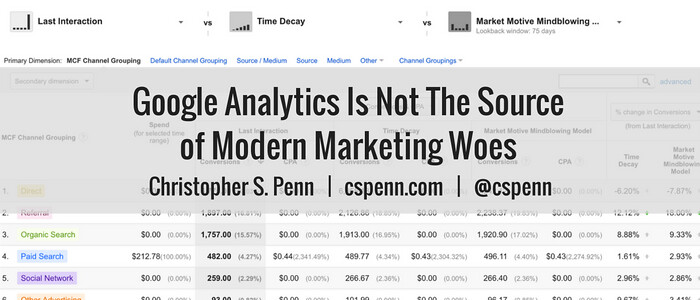I read with curiosity recently a piece on TechCrunch titled “How Google Analytics Ruined Marketing”. The author posited that Google Analytics’ focus on digital and last-touch attribution has ruined marketing. How? By strongly encouraging marketers to think in pre-defined digital buckets and about last-touch attribution only.
The latter criticism is wrong; Google Analytics hasn’t used a last-touch attribution only model since August 24, 2011 when Multi-Channel Funnels arrived. Compound the built-in attribution models with your own custom models and other data sources, and you’ll find Google Analytics can provide a robust, powerful attribution model.
The greater problem the author neglects to address well is incuriosity. This is the root of digital marketing analytics problems, not a software package. Incuriosity is the state of mind when you don’t ask questions, when you don’t explore, when you accept what’s given to you at face value. Incuriosity is the bane of researchers, analysts, data-driven marketers, and businesses focused on growth.
If you accept Google Analytics out of the box and don’t do any customization, don’t learn how the software works and what its strengths and limitations are, how it fits into the entire marketing ecosystem, then yes, it will be of limited use. It can lead you astray.
The same is true of any tool.
If you fail to understand how a frying pan works, when it’s the best tool for the job, and what it’s bad at, you’ll be that guy or that gal trying to make soup in it. The problem isn’t the frying pan. The problem is you.
Incuriosity Tests
Here’s the first incuriosity test to find out how incurious you or someone you work with is. How many times in an average work week do you ask these questions (or variants thereof) of your marketing tools, data, programs, etc.?
- How does this work?
- What if we did X?
- Why is this the way it is?
If the answer is never, you have an incuriosity problem.
Here’s the second incuriosity test. How many times in the last 90 days have you read something new and tried it? For example, in this piece about analyzing the text of a political candidate’s tweets, the author lists the actual code used in the free, open-source analytics package R.
Did you try to run the experiment yourself, since all the software is free of cost? Or did you simply accept the piece as written?
If you never try anything you’ve read in a 90 day period, you have an incuriosity problem.
Become Curious
The solution is to reverse the above tests. Ask how, what, and why of everything that piques your interest. Try new things when you read about them. Be curious about the world around you, about what you read, about the tools you use on a daily basis. Seek kaizen, the Japanese word that means continuous, never-ending improvement.
When you do, you’ll unlock the true power of all your marketing tools, from Google Analytics to your CRM to the very minds of the customers you’re acquiring.
You might also enjoy:
- You Ask, I Answer: Retrieval Augmented Generation for Tax Law?
- Mind Readings: Generative AI and Addition vs Substitution of Jobs
- Almost Timely News, January 14, 2024: The Future of Generative AI is Open
- Almost Timely News, January 7, 2024: Should You Buy a Custom GPT?
- You Ask, I Answer: AI Works And Copyright?
Want to read more like this from Christopher Penn? Get updates here:
 Take my Generative AI for Marketers course! |



Leave a Reply